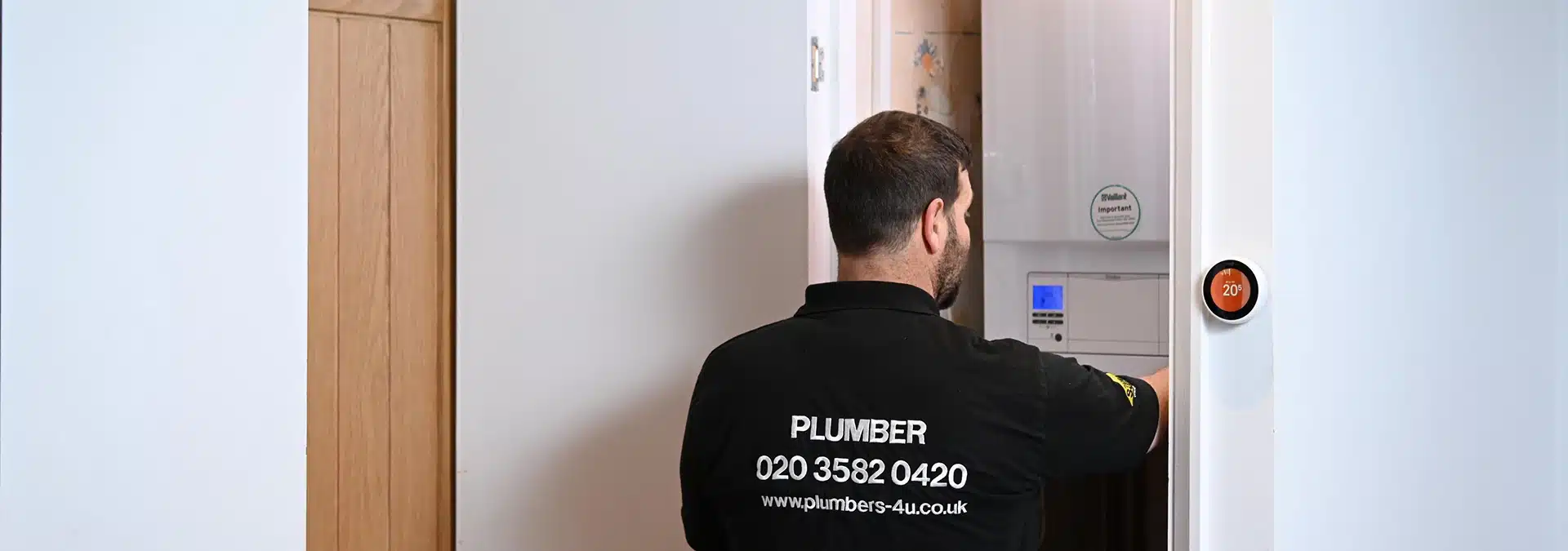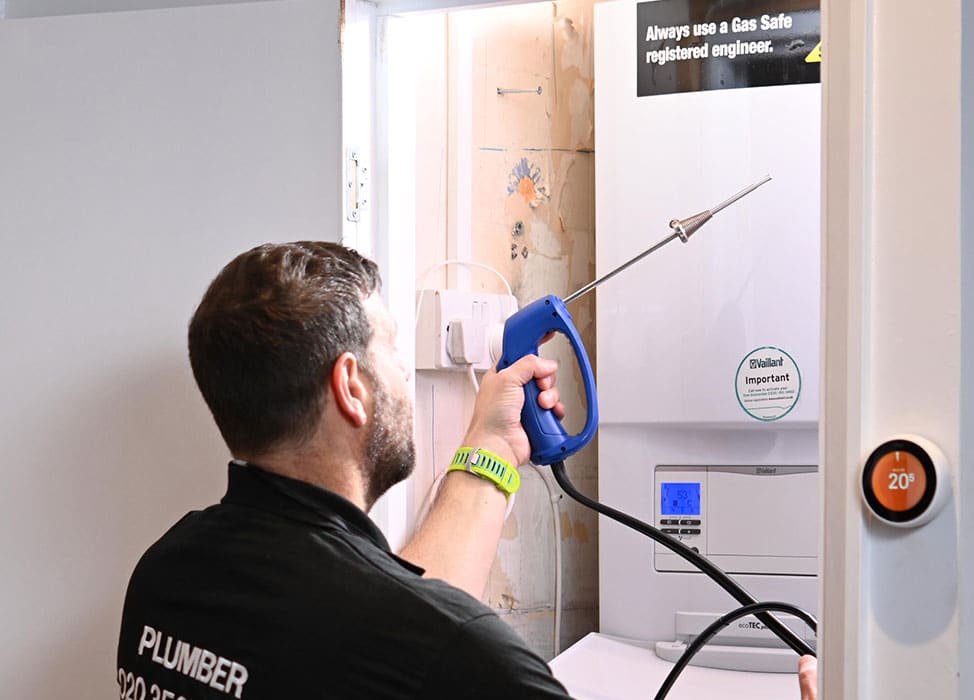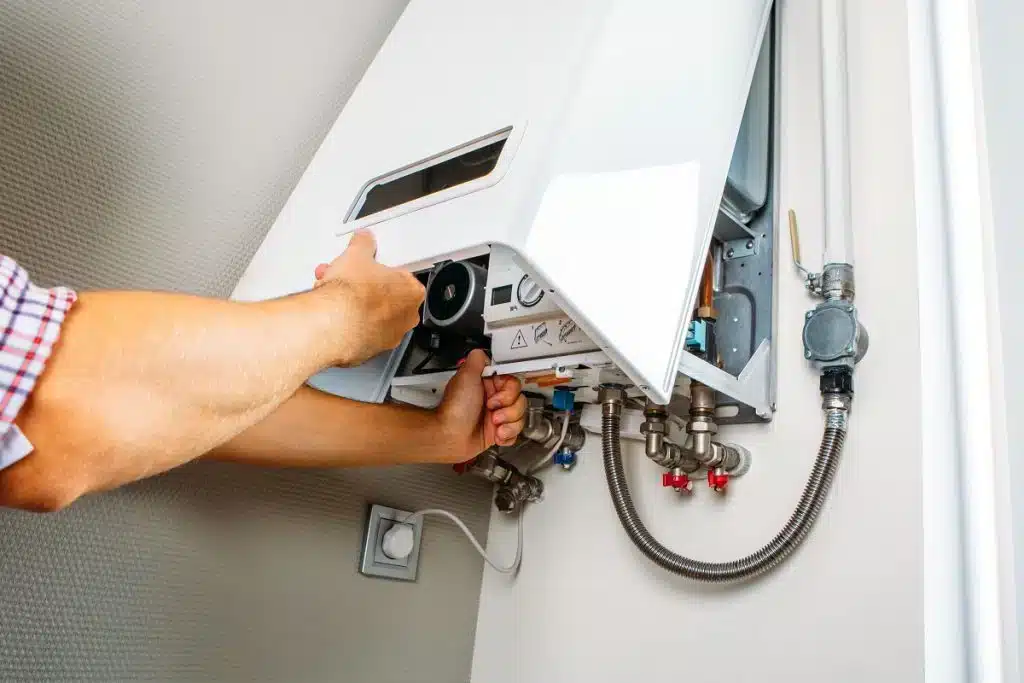 Understanding Popular Boiler Fault Codes: A Landlord’s Guide
Understanding Popular Boiler Fault Codes: A Landlord’s Guide

Ever found yourself in the chilly grip of a winter morning, teeth chattering, only to discover your trusted boiler flashing an enigmatic fault code? Or perhaps you’re a landlord who’s been on the receiving end of a desperate call about popular boiler fault codes. Confusing aren’t they?
If these scenarios ring true, then it’s time to take action. This guide will help decipher those mysterious error messages – from Worcester Bosch’s cryptic EA and F75 warnings to Vaillant’s puzzling F.49 or Ideal Boiler’s perplexing C0.
We’ll go beyond mere translations too. We’ll delve into common causes behind these errors and provide practical solutions so that next time when your trusty heating companion starts speaking in coded language; you won’t be left out in the cold!
Decoding Boiler Fault Codes
Boiler fault codes. They’re like a foreign language, right? Fret not. We’ve got you covered.
The Language of Boiler Fault Codes
Think of boiler fault codes as your boiler’s way of saying, “Hey mate, I need help.” Each code points to an issue it’s facing. Your boiler manual, for example, can tell you what each error or locking error signifies.
A Little Code Breakdown
‘F75’ on a Vaillant? That’s likely a flow sensor issue. ‘E133’? You might be looking at failed ignition attempts. Or perhaps it’s ‘EA’ flashing up? Ah. A blocked condensate pipe is the culprit.
What About Those Strange Symbols?
Saw something like this: ️️ on your control board? It may look confusing but let me break that down: Sensor disconnected or shorted, Maximum temperature exceeded (time to check the heat exchanger), and Blocked sump/condensate trap – probably needs cleaning out.
Beyond Just Numbers and Letters…
So now we know our faults from errors, we must remember one thing. Faults are rarely isolated incidents. Take note – water pressure issues could stem from more than just the pressure gauge. They could hint at problems with your heat exchanger, or even a blocked condensate pipe.
Importance of Promptly Addressing Boiler Fault Codes
Fault codes aren’t to be ignored. Swift action can prevent small issues from turning into costly repairs.
A stitch in time…
So remember, think of boiler fault codes as an early warning system. It’s crucial to take them seriously.
Struggling with boiler fault codes? They’re not as cryptic as you think. Just like a car’s warning light, these SOS signals need swift action. Keep your home warm and safe by learning to speak ‘boiler’. #BoilerFaultCodes #HomeMaintenance
Click to Tweet
Common Worcester Bosch Boiler Fault Codes
We’re diving into the world of Worcester Bosch boilers. Fault codes. They’re your boiler’s way of asking for help. The EA code is a common cry. It means ‘blocked condensate pipe’. Don’t ignore it.
Blocked Condensate Pipe (EA)
A blocked condensate pipe can stop your boiler working properly. Ice or debris often causes this issue in cold weather.
No Water Pressure (U9/A1/No Code)
Your pressure gauge will be on zero if you’ve got no water pressure. This fault could mean issues with the main heat exchanger, gas supply, temperature sensor or flow sensor.
Sensor Change Required (F75)
If F75 flashes up, you need to change a sensor. Could be primary flow, return temperature or maximum temperature sensors causing trouble here.
Fixing Common Faults
- Tackle EA: Defrost any ice blocking your condensate pipe using hot water – but not boiling. Boiling can damage pipes and valves.
- Battle U9/A1: You might need professional help to get that pressure back up. The problem could lie anywhere from valve coil disconnection to faulty ignition attempts.
- Fight F75: If all else fails and there’s still an error message after trying some fixes yourself? Time for expert intervention.
While we have provided information about three key fault codes here today; do remember that these are just tip-of-the-iceberg stuff. The Worcester Bosch boiler manual has a complete list of error codes that can come in handy for any DIY fixes you might need to carry out.
Regular maintenance and annual servicing will help keep those pesky fault codes at bay, so don’t forget to get your boiler checked by a professional once every year. If you’ve tried everything and the fault still persists, don’t worry. We’re here to help. Just remember, there’s always a solution.
Key Takeaway:
Boiler SOS: Remember, EA signals a blocked condensate pipe – defrost with hot water. No water pressure? Check the heat exchanger or sensors. F75 flashing means sensor change time. But if you’re still seeing error messages after your DIY attempts, it’s probably time to call in an expert.
Unfortunately, there’s no content provided in the paragraph to rewrite. Could you please provide the text that needs revision? This will let me give you a better and more accurate response.
Vaillant Boiler Fault Codes Explained
When your Vaillant boiler starts flashing fault codes, it’s asking for help. But what are these codes saying? Let’s decode.
- F.49: eBUS Fault: The F.49 code indicates an eBUS fault. It means the connection between the control board and other parts is dodgy.
- F.52: Mass Flow Sensor Connection Fault: Next up, we have F.52 – a mass flow sensor connection issue. This little gizmo measures how much gas flows into your boiler, so if there’s a problem here you’ll likely notice your home isn’t as toasty as usual.
- F54: Gas Pressure Fault: Last but not least in our list of common issues is F54 – signalling trouble with gas pressure which can impact heating efficiency and safety levels too.
Now that you know what each code means, fixing them should be simpler. But remember folks; always call a professional if things seem out of hand or beyond basic troubleshooting tips from your boiler manual.
Note: The advice given above applies only to specific models of Vaillant boilers. Always consult your manufacturer’s guide or contact customer support before trying to fix any faults yourself.
Ideal Boilers and Their Fault Codes
Got an Ideal boiler at home? Ever noticed those strange flashing codes on the control board?
No need to panic. Those are just fault codes, your boiler’s way of asking for a bit of attention.
The ABCs of Ideal Boiler Fault Codes
C0, F1, L2… what do these mean? Well, C0 is known as the BCC activation fault – sounds scary but it’s usually about electrical connections or gas supply issues.
F1: The Pressure Drop Puzzle
F1 implies low water pressure. It means your system needs more water in its veins. You might want to check that Ideal Boiler Manual before adjusting anything though.
Losing Flame with Code L2
L2 signals flame loss during operation – like losing spark halfway through a date. A reset button could fix this; otherwise get help from Gas Safe registered engineers because it might be due to faulty ignition attempts or problems with airflow around the main heat exchanger (your boiler’s heart.).
Puzzled by More Error Messages?
- Error code H5 signifies blocked sump/condensate trap – time to unblock things.
- If you see F7 along with a warning triangle then there’s overheat situation – think boiling kettle left unchecked. Hints: maximum temperature sensor readings can give clues.
Maintenance Matters too.
- An annual servicing helps prevent common faults like E1 (sensor wet) and E9 (primary flow sensor overheated). It also keeps the boiler working at optimum efficiency – more hot water and less energy bills.
A Final Word
So, these are just a few common fault codes you might see on your Ideal boiler. But remember, if ever in doubt, always consult with your Ideal Heating.
Key Takeaway:
Don’t fret over flashing codes on your Ideal boiler – they’re just fault signs asking for attention. C0 indicates BCC activation faults, usually related to electrical or gas issues. F1 is about low water pressure and L2 signifies flame loss during operation. Regular servicing helps prevent common errors like E1 and E9 while maintaining efficiency.
The Role of Regular Maintenance in Preventing Boiler Faults
Boiler maintenance isn’t a “nice to have”. It’s crucial. It can prevent many common boiler faults. Your boiler, like your car, needs regular check-ups. Not convinced?
Tackling Common Causes Early On
You see, annual servicing spots issues early on. Sensors wet? We fix them before they short out. Flow sensor overheated? Sorted before it stops working altogether.
Avoid Unnecessary Costs and Discomfort
Besides, ignoring small problems today means big repair bills tomorrow. You also risk having no hot water or heating just when you need it most.
Maintaining Efficiency for Energy Savings
Regular maintenance ensures optimal performance from your Worcester Bosch Boiler. Vaillant Boilers Manual here too.Ideal Boilers Guide over here as well…. So the better your boiler works; the less energy it uses. That means lower fuel bills for you.
No more random error codes popping up
No EA (blocked condensate pipe), U9/A1/No code (low water pressure), F75 (sensor change)..
So remember: A stitch in time saves nine. Get ahead of those pesky fault codes by scheduling regular checks with our team at Plumbers 4U. And enjoy peace of mind knowing your boiler is in tip-top shape. Our skilled technicians are on hand to aid you with whatever it takes.
Remember: Regular maintenance. Annual servicing. Because nobody wants a cold shower on a Monday morning.
Ever had a cold shower on Monday morning? Not fun, right? Regular boiler maintenance is key. It prevents faults and saves energy. Remember: A stitch in time saves nine…and keeps you warm. #BoilerCare ️
Comparing Common Fault Codes Across Popular Boiler Brands
The boiler game is full of brands. Each with its own language of fault codes. Confusing, right? Worcester Bosch, Vaillant, and Ideal. These are the big three in our comparison today.
The Worcester’s Tale
- A brand known for durability but not without issues.
- Error EA? That’s a blocked condensate pipe talking to you.
- No code or U9/A1 indicates low water pressure – check that gauge.
Navigating Vaillant Faults
Vaillant fault codes aren’t always clear-cut. Let me simplify things for you.
F.49 screams an eBUS fault.
A F.52 means a mass flow sensor connection issue.
Got an F54? You’ve got gas pressure problems.
Ciphering Ideal Errors
- Ideal boilers, great units but they can be tricky.
- C0 implies BCC activation trouble.
- F1 tells us about low water pressure, again keep an eye on that gauge.
- Losing flame often? Look out for L2.
- Boiler error codes don’t need to feel like cracking the Enigma code.
- Let’s take it from confusion to clarity.
- You’ve got this; I’m here just in case.
Decoding boiler fault codes needn’t feel like cracking the Enigma. Navigate Worcester, Vaillant and Ideal errors with ease. Turn confusion into clarity for your home heating needs. #BoilerFaults #DIYMaintenance
Click to Tweet
External Factors Impacting Boiler Performance and Fault Codes
Your boiler’s a tough cookie, but even it can’t ignore the weather. Cold snaps or strong wind? They’re not just annoying for you. Your boiler feels it too.
Cold Weather: You see that condensate pipe? It loves to freeze in cold weather. Blocked condensate pipe – classic winter issue.
This blocking error triggers an avalanche of fault codes on your control board. That’s one snowball fight we don’t want to be part of.
The Strong Wind Factor
Strong winds are another party crasher. Picture this: high gusts blow out the established flame inside your boiler leading to ignition attempts failure. Worcester Bosch Boiler Manual, explains how different fault codes relate to these issues.
Solutions You Need To Know
- Befriend The Reset Button:
- Fault code shows up because of blocked sump/condensate trap?
- No worries. Just hit the reset button after making sure everything is safe again.
- Maintain Regular Checks On External Factors:
- Routine checks help spot potential problems before they become big headaches.
- If a storm’s brewing, check if there are any loose connections which could affect gas supply or pressure gauge readings.
Need more help? Ideal Boiler Manual, is a handy resource for common fault codes.
The Final Word on Weather Impact:
Mother Nature can throw curveballs at your boiler’s performance. But with the right expertise and attention, you can triumph over any meteorological surprises.
Even the toughest boiler can’t ignore Mother Nature’s curveballs. Cold snaps and gusty winds can trigger fault codes. But don’t fret – regular checks, a friend in the reset button, and handy manuals will keep your heating game strong. #BoilerCareTips
When to Seek Professional Help for Boiler Fault Codes
Sometimes, your boiler’s fault codes are too complex to handle on your own. When you see a warning triangle or an unfamiliar error code, it might be time to call in the cavalry.
Remember that gas safe professionals exist for a reason. They’re equipped with specialised knowledge and experience dealing with intricate issues like blocked sump/condensate traps and ignition attempts gone wrong.
If there’s one thing you don’t want is turning simple boiler faults into big problems because of DIY missteps. So, let’s talk about when exactly should you ring up that qualified engineer?
The Pressure Gauge Indicates Trouble
Your boiler’s pressure gauge can tell quite a tale. If it shows low water pressure persistently despite all efforts, reach out for professional help without delay.
The Manual Leaves You Puzzled
You’ve checked the boiler manual, but the gibberish seems more challenging than deciphering ancient hieroglyphics? A quick call to your trusted engineer will clear things right up.
Frequent Resets Don’t Do The Trick
Constantly hitting the reset button isn’t normal behaviour for any appliance – including boilers. It signals underlying trouble which needs immediate attention from an expert.
Persistent Locking Errors Worry You
A persistent locking error indicates something amiss in your heating system – likely involving its main heat exchanger or control board – not good news by any means.
No Hot Water Despite Max Temperature Setting
If max temperature settings aren’t producing hot water, it’s a clear signal to call in the professionals. They’ll assess whether the main heat exchanger failed or if there’s another issue at hand.
Boiler troubles can be tricky and dangerous if mishandled. So don’t hesitate to seek professional help when these situations arise.
Key Takeaway:
Boiler fault codes can be complex, but don’t let DIY missteps turn small faults into big problems. If your boiler’s pressure gauge indicates trouble or the manual leaves you puzzled, get a professional on board. Persistent resets, locking errors and no hot water despite max temperature settings also signal that it’s time to call in an expert.
Conclusion
So, you’ve delved into the labyrinth of popular boiler fault codes, from Worcester Bosch’s EA and F75 to Vaillant’s F.49 or Ideal Boiler’s C0. You’ve unravelled their meanings, potential causes and fixes.
You’ve understood the importance of swift action when these codes appear – not just for comfort but also to protect your heating system. And let’s not forget about regular maintenance as a preventive measure against common faults!
You’re now equipped with knowledge on how external factors like cold weather can affect your boiler performance too. But remember, if things get tricky – don’t hesitate to call in a Gas Safe registered engineer for help. A landlord prepared is half victorious over winter chills! Your understanding of boiler error messages could be the warm cloak that shields tenants from frosty mornings.



